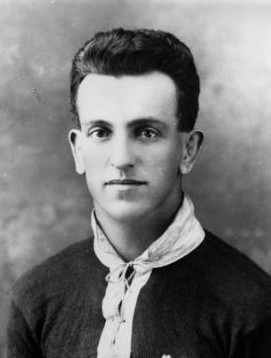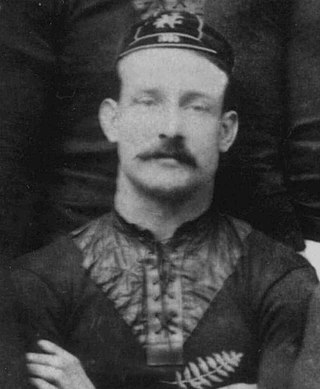Related Research Articles

David Gallaher was an Irish-born New Zealand rugby union footballer best remembered as the captain of the "Original All Blacks"—the 1905–06 New Zealand national team, the first representative New Zealand side to tour the British Isles. Under Gallaher's leadership the Originals won 34 out of 35 matches over the course of tour, including legs in France and North America; the New Zealanders scored 976 points and conceded only 59. Before returning home he co-wrote the classic rugby text The Complete Rugby Footballer with his vice-captain Billy Stead. Gallaher retired as a player after the 1905–06 tour and took up coaching and selecting; he was a selector for both Auckland and New Zealand for most of the following decade.

Duncan Fulton Thompson MBE was an Australian veteran of both WWI and WWII and a rugby league footballer, coach and administrator. He was wounded on active service in WWI and has been named amongst the nation's finest footballers of the 20th century, and is regarded as the father of modern coaching. He was appointed a Member of the Order of the British Empire (MBE) in the 1960 New Year Honours "for services to the community in the field of Sport."
William George "Twit" Tasker was an Australian World War I soldier who had been a national representative rugby union player making six Test appearances for the Wallabies.
Hercules Richard "Bumper" Wright was a New Zealand rugby footballer who was part of the professional 1907–1908 New Zealand rugby tour of Great Britain.
William Thornton Watson, DSO, MC, DCM was a New Zealander who served as an officer in the Australian Imperial Force in both World Wars. Prior to and after the First World War he had a distinguished rugby union career, representing Australia in eight Test matches and captaining the national side on three occasions. During the New Guinea Campaign in the Second World War he was the Commanding Officer of the Papuan Infantry Battalion. Following the war, he served as Australia's Vice – Consul to New York.
Frank Whitmore Mellish, MC was a rugby union footballer who played internationally for England and South Africa. After his rugby career, he served as a selector for the South African team and as the manager of the 1951 Springbok tour of the British Isles and France.

Herbert "Bert" Avery (1895–1966) was a New Zealand rugby union and professional rugby league footballer who played representative rugby league (RL) for New Zealand.
Beethoven Algar, commonly known as Beet, was a New Zealand rugby union player. A back who played in any position from first five-eighth to wing, Algar represented Wellington at a provincial level, and was a member of the New Zealand national side, the All Blacks, in 1920 and 1921. He played six matches for the All Blacks, including one as captain, but did not appear in any internationals.
John Lorraine Sullivan was a New Zealand rugby union player, coach and administrator. A three-quarter and second five-eighth, Sullivan represented Taranaki at a provincial level, and was a member of the New Zealand national side, the All Blacks, from 1936 to 1938. He played nine matches for the All Blacks including six internationals.

Henry "Norkey" Dewar was a New Zealand rugby union forward, who played for the All Blacks, and represented Taranaki and Wellington provinces.

Frank Reginald Wilson was a New Zealand rugby union player who represented his country in 1910.

Michael Cain was a New Zealand rugby union player. A hooker, Cain represented Taranaki at a provincial level, and was a member of the New Zealand national side, the All Blacks, from 1913 to 1914. He played 24 matches for the All Blacks including four internationals. He was selected again for the All Blacks team to tour Australia in 1920, but withdrew.
Peter Standish Burke was a New Zealand rugby union player, coach and administrator. A lock and number 8, Burke represented Bay of Plenty, Auckland and Taranaki at a provincial level, and was a member of the New Zealand national side, the All Blacks, in 1951, 1955 and 1957. He played 12 matches for the All Blacks including three internationals.
George Loveridge was a New Zealand rugby union player. A wing three-quarter, Loveridge represented Taranaki at a provincial level, and was a member of the New Zealand national side, the All Blacks, in 1913 and 1914. He played 11 matches for the All Blacks but did not appear in any internationals.
Charles Brown was a New Zealand rugby union player. A halfback, Brown represented Taranaki at a provincial level, and was a member of the New Zealand national side, the All Blacks, in 1913 and 1920. He played nine matches for the All Blacks including two internationals.

Colin Macdonald Gilray was a Scottish-born rugby union player, soldier and educationalist. He represented both New Zealand and Scotland in rugby union and won the Military Cross during World War I as a captain in the British Rifle Brigade. A Rhodes Scholar, he became headmaster of both John McGlashan College in Dunedin, New Zealand, and Scotch College, Melbourne, and served as deputy chancellor of the University of Melbourne on two separate occasions.
Harold Vivian "Toby" Murray was a New Zealand rugby union player. Predominantly a wing-forward, Murray represented Canterbury at a provincial level, and was a member of the New Zealand national side, the All Blacks, in 1913 and 1914. He played 22 matches for the All Blacks including four internationals, scoring 12 tries in all.

James Hislop Parker was a New Zealand soldier, sportsman and businessman. He achieved distinction as a sprinter before representing his country at rugby union, including as a member of so-called "Invincibles" team of 1924–25. He was a decorated World War I veteran, and had a business career that included service as chairman of the New Zealand Apple and Pear Marketing Board.

Alfred Bayly was a New Zealand rugby union player and administrator, and cricketer.
References
- 1 2 3 4 "Masters, Frederick Harold - WW1 4/469 - Army". Archives New Zealand. Retrieved 20 December 2015.
- ↑ Knight, Lindsay. "Harold Masters". New Zealand Rugby Union. Retrieved 20 December 2015.
- ↑ "No. 29664". The London Gazette (Supplement). 11 July 1916. p. 6956.
- ↑ "Honours for soldiers". Evening Post. 8 January 1918. p. 7. Retrieved 20 December 2015.